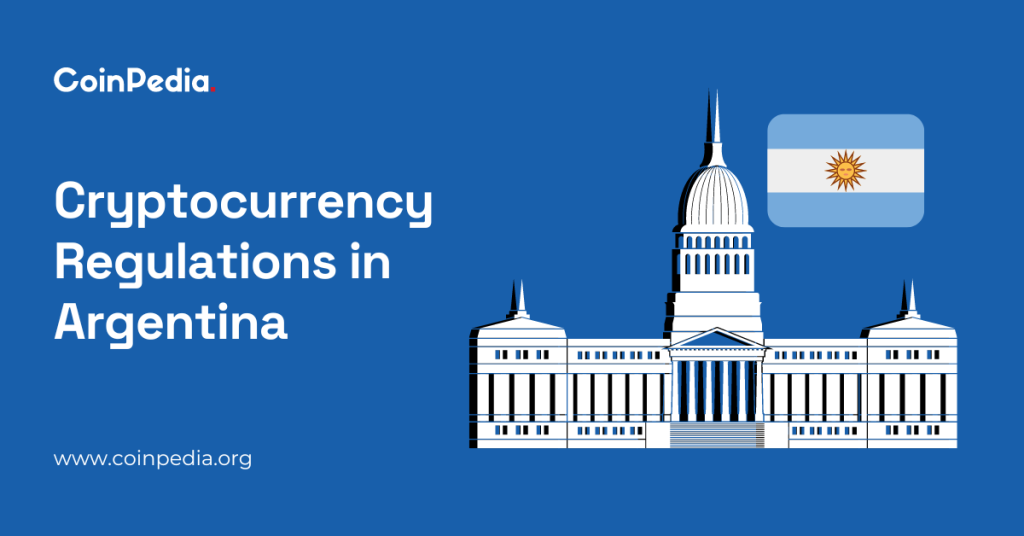Crypto Regulations in Argentina 2024

The post Crypto Regulations in Argentina 2024 appeared first on Coinpedia Fintech News
Argentina, officially called the Argentine Republic, is a country in South America. It’s one of the biggest countries globally and the second largest in Latin America. In Argentina, Bitcoin isn’t recognized as official money because it’s not issued by the Central Bank. However, there are no rules against using it. Both mining Bitcoin and trading it are legal in Argentina. Bitcoin is treated as a commodity under the Argentine Civil Code, and its transactions follow the rules of that code.
Argentina keeps tight control over foreign currencies to guard against inflation and prevent money from leaving the country. Only the Central Bank of Argentina can make legal currency. Despite this, Argentina is open to adopting cryptocurrencies.
Argentina Crypto Regulations 2024
30-05-2024 : Argentina’s President Milei Meets Tech Leaders to Improve Business Relations
Argentinian President Javier Milei met with high-profile figures during his visit to Silicon Valley in California, including top tech CEOs like Sam Altman. He used the opportunity to promote business relations with Argentina, emphasizing its potential under his leadership.
25-03-2024 : Argentina Implements Registration Rules for Crypto Companies
Argentina’s securities regulator, Comisión Nacional de Valores (CNV), announced that unregistered virtual asset service providers cannot operate in the country. The move aligns with FATF recommendations. Crypto firms must register with the government to comply with Anti-Money Laundering (AML) and Combatting the Financing of Terrorism (CFT) laws.
Government stance on Cryptocurrencies
Argentina’s stance on cryptocurrency is evolving, with ongoing changes shaping its regulatory environment. While Bitcoin isn’t legal tender, there is no outright ban on cryptocurrencies. In late 2022, the government set up a National Blockchain Committee to explore cryptocurrency regulation. In 2023, Buenos Aires announced plans to run validator nodes on the Ethereum blockchain and issue blockchain-based digital IDs, showing a commitment to blockchain technology.
Despite relaxed crypto policies, the Central Bank of Argentina (BCRA) prohibits banks from trading digital assets or offering crypto services. Argentina has no specific regulations for cryptocurrencies or securities laws. The National Securities Commission (CNV) has warned investors about the risks of initial coin offerings (ICOs) and clarified that some ICOs might fall under its control. In May 2021, the CNV and the Central Bank issued a joint statement about the risks of using and investing in crypto assets.
Cryptocurrencies like Bitcoin are defined by the Financial Information Unit (UIF) as digital representations of value that can be traded digitally, acting as a medium of exchange, a unit of account, and a store of value, but they are not legal tender and are not issued or guaranteed by any government in Argentina. The anti-money laundering (AML) law requires certain entities, such as brokers, credit card companies, and insurance companies, to comply with the Know-Your-Customer (KYC) process and report suspicious transactions to the UIF.
Taxation of Crypto in Argentina
On February 2, 2024, Milei’s presidency, Argentine government proposed comprehensive bill “Law of Foundations and Initial Measures for Argentine Liberty.” This legislative proposal, driven Interior Minister Guillermo Francos, aims ease tax burdens various sectors Argentina.
One notable aspect legislative move omission provisions cryptocurrencies tax declarations. Previously, cryptocurrency owners privilege declaring holdings enjoying favorable fixed tax rate. However, proposed legislation passes, holding cryptocurrencies Argentina incur taxes. Holding crypto remain untaxed, tax obligations arise capital gains generated sales, and too, specific threshold.
Additionally, international transfers cryptocurrencies subject tax rate ranging 5% 15%, aiming attract foreign cryptocurrency investments. Notably, bill proposes provision declaring cryptocurrencies without necessitating evidence origin.
Cryptocurrency Mining in Argentina
Mining cryptocurrencies is permitted in Argentina and there are no specific rules or regulations on crypto mining at present.
Crypto mining booms on cheap subsidized energy in Argentina. A town called Serodino with 6,000 residents of Argentina is looking to upgrade its rail infrastructure funding by crypto mining. The town has begun purchasing graphic cards and mining equipment to generate income via crypto mining to gather funds for upgrading its rail infrastructure. The minted cryptocurrencies are then converted into Argentina’s fiat currency to finance some infrastructural renovations.
Historical Events & Announcements
21-12-2023 : Argentina’s Foreign Minister Approves Bitcoin Use in Contracts and Payments
Argentina’s Foreign Minister, Diana Mondino, announced a decree allowing Bitcoin and other cryptocurrencies for contracts and payments. The decree, aimed at economic reform, permits their use under specific conditions, marking a significant step towards cryptocurrency acceptance in the country.
19-04-2022: New anti-Crypto Austerity Regime by IMF crafts Argentina.
The International Monetary Fund (IMF) after two years of wrangling approves a new $45 million refinancing agreement with Argentina. By offering Argentina a much-needed reprieve from debt payments until 2026, the IMF sweetened the deal.
13-04-2022: Argentina Securities Regulator launches innovation hub to discuss regulated crypto investments.
18-11-2021:Crypto sales and purchases are subject to the tax of up to 0.6% on banking debits and credits. Argentina updates its “check tax” rules to clarify crypto exchanges are not exempted.
08-11-2021: Argentina uses Lemon a Crypto app or Card in Argentina to support ETH,USDT, DAI, and supports BTC
23-04-2020:- The Central Bank of Argentina joined hands with IOV labs, a Bitcoin startup to work on the blockchain-based payment network.
26-11-2019:- Argentina introduces new Tax rules and includes 11 new cryptos in its authorized cryptocurrency list allowed to trade.
01-11-2019:- The Central Bank bans the purchase of Bitcoins using credit cards to preserve the country’s foreign exchange reserves.
07-02-2019:– Public transport in Argentina got access to receive payments in Bitcoin. The customers already use a national contactless smart card which can be loaded with Bitcoins.
Conclusion
Argentina’s cryptocurrency rules are changing as the country deals with economic issues like inflation. More people are using crypto, and this is shaping how Argentina regulates it.
Government agencies are getting involved, and discussions about the Finance Bill in 2024 will clarify how cryptocurrency can be used for buying, trading, and investing in Argentina. The number of people investing in Bitcoin, Tether, Ethereum, or Dai has grown tenfold in Argentina.




